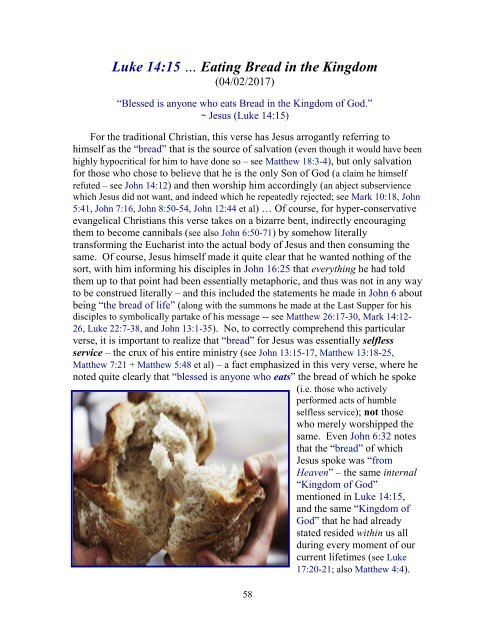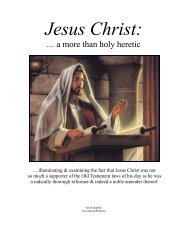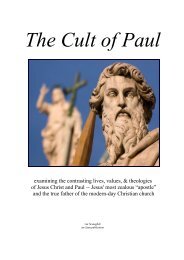My Favorite Verses - Vol V (Feb 17 to Jun 17)
An illustrated collection of brief commentaries on some of the Bible’s most beloved (and some of its least understood) passages, parables, verses & sayings
An illustrated collection of brief commentaries on some of the Bible’s most beloved (and some of its least understood) passages, parables, verses & sayings
Create successful ePaper yourself
Turn your PDF publications into a flip-book with our unique Google optimized e-Paper software.
Luke 14:15 … Eating Bread in the Kingdom<br />
(04/02/20<strong>17</strong>)<br />
“Blessed is anyone who eats Bread in the Kingdom of God.”<br />
~ Jesus (Luke 14:15)<br />
For the traditional Christian, this verse has Jesus arrogantly referring <strong>to</strong><br />
himself as the “bread” that is the source of salvation (even though it would have been<br />
highly hypocritical for him <strong>to</strong> have done so – see Matthew 18:3-4), but only salvation<br />
for those who chose <strong>to</strong> believe that he is the only Son of God (a claim he himself<br />
refuted – see John 14:12) and then worship him accordingly (an abject subservience<br />
which Jesus did not want, and indeed which he repeatedly rejected; see Mark 10:18, John<br />
5:41, John 7:16, John 8:50-54, John 12:44 et al) … Of course, for hyper-conservative<br />
evangelical Christians this verse takes on a bizarre bent, indirectly encouraging<br />
them <strong>to</strong> become cannibals (see also John 6:50-71) by somehow literally<br />
transforming the Eucharist in<strong>to</strong> the actual body of Jesus and then consuming the<br />
same. Of course, Jesus himself made it quite clear that he wanted nothing of the<br />
sort, with him informing his disciples in John 16:25 that everything he had <strong>to</strong>ld<br />
them up <strong>to</strong> that point had been essentially metaphoric, and thus was not in any way<br />
<strong>to</strong> be construed literally – and this included the statements he made in John 6 about<br />
being “the bread of life” (along with the summons he made at the Last Supper for his<br />
disciples <strong>to</strong> symbolically partake of his message -- see Matthew 26:<strong>17</strong>-30, Mark 14:12-<br />
26, Luke 22:7-38, and John 13:1-35). No, <strong>to</strong> correctly comprehend this particular<br />
verse, it is important <strong>to</strong> realize that “bread” for Jesus was essentially selfless<br />
service – the crux of his entire ministry (see John 13:15-<strong>17</strong>, Matthew 13:18-25,<br />
Matthew 7:21 + Matthew 5:48 et al) – a fact emphasized in this very verse, where he<br />
noted quite clearly that “blessed is anyone who eats” the bread of which he spoke<br />
(i.e. those who actively<br />
performed acts of humble<br />
selfless service); not those<br />
who merely worshipped the<br />
same. Even John 6:32 notes<br />
that the “bread” of which<br />
Jesus spoke was “from<br />
Heaven” – the same internal<br />
“Kingdom of God”<br />
mentioned in Luke 14:15,<br />
and the same “Kingdom of<br />
God” that he had already<br />
stated resided within us all<br />
during every moment of our<br />
current lifetimes (see Luke<br />
<strong>17</strong>:20-21; also Matthew 4:4).<br />
58


















